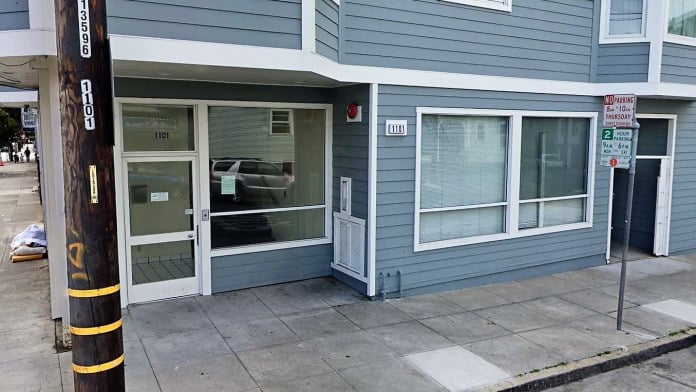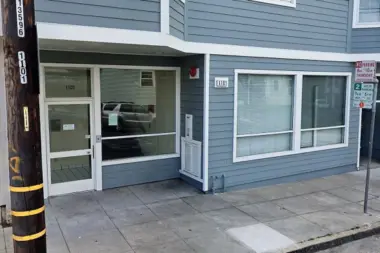About El Dorado Community Service Center – Fort Help Mission
El Dorado Community Service Center (ECSC) provides low-cost integrated medical and behavioral healthcare services including substance use recovery across Southern and Northern California. Their Fort Help Mission is situated on Capp Street in the vibrant Mission District neighborhood of San Francisco within San Francisco County, California. They are part of a network of community clinics serving San Diego, Los Angeles and San Francisco counties. They accept Medicare and MediCal, which helps keep costs low. They also offer sliding fee scale payments for the uninsured. This lets you pay for care according to your income and family size, ensuring no one gets denied care due to inability to pay. Another appealing thing is that they offer services in English and Spanish.
Recovery in Charming San Fransisco
This area is known for its Latino culture, street art and diverse dining scene. The clinic is near Mission Street and 24th Street with easy access to businesses and parks. This includes Precita Park about 10 minutes walk from the clinic and the popular Dolores Park and Bernal Heights Park, which are just a mile nearby. It is less than three miles south of downtown San Francisco, making it centrally located.
Medication-Supported Recovery for Lasting Abstinence
ECSC’s Fort Help Mission specializes in medication assisted treatment or MAT for opioid use recovery and alcoholism treatment. This clinically proven recovery technique combines meds approved by the FDA and counseling to deliver “whole person” care. The clinic may offer a prescription of Suboxone and Disulfiram for their MAT program to help you curb physiological cravings and eliminate painful withdrawal symptoms.
This is backed up with individual and group counseling to help you tackle underlying psychological and emotional issues contributing to your substance dependence. Therapy also helps you build practical coping mechanisms that inspire a sober lifestyle and prevent relapse. Pairing therapy and meds this way takes care of the physical and psychological symptoms. This ensures holistic care involving general wellness of the body, mind and soul. It also keeps you in recovery longer, thereby facilitating lasting abstinence.
Harm Reduction and Preventive Care
ECSC’s Fort Help Mission offers naloxone or Narcan access and education for overdose prevention. Narcan is a life-saving medication that can reverse the effects of opioid overdoses. The clinic ensures individuals and families are educated on its proper use to reduce overdose fatalities and enhance safety. The clinic also offers HIV/AIDS and STD testing. People who inject IV drugs are susceptible to HIV/AIDS infections due to the sharing of needles and other drug paraphernalia. Testing ensures early detection & treatment to prevent community spread.
Latest Reviews
Rehab Score
Gallery


Accepted Insurance
Other Forms of Payment
Private insurance refers to any kind of healthcare coverage that isn't from the state or federal government. This includes individual and family plans offered by an employer or purchased from the Insurance Marketplace. Every plan will have different requirements and out of pocket costs so be sure to get the full details before you start treatment.
Self-pay involves paying for treatment out of your own pocket. You can use savings or credit, get a personal loan, or receive help from family and friends to fund your treatment. If you don't have insurance or your insurance plan doesn't cover a specific program, self-pay can help ensure you still get the care you need.
Financial aid can take many forms. Centers may have grants or scholarships available to clients who meet eligibility requirements. Programs that receive SAMHSA grants may have financial aid available for those who need treatment as well. Grants and scholarships can help you pai for treatment without having to repay.
Medicaid is a state based program that helps lower-income individuals and families pay for healthcare. Medicaid covers addiction treatment so those enrolled can use their coverage to pay for rehab. When a program accepts Medicaid the client often pays very little or nothing out of their own pocket.
Addiction Treatments
Levels of Care
Outpatient Programs (OP) are for those seeking mental rehab or drug rehab, but who also stay at home every night. The main difference between outpatient treatment (OP) and intensive outpatient treatment (IOP) lies in the amount of hours the patient spends at the facility. Most of the time an outpatient program is designed for someone who has completed an inpatient stay and is looking to continue their growth in recovery. Outpatient is not meant to be the starting point, it is commonly referred to as aftercare.
Drug and alcohol addiction often takes a heavy toll on one's body. Over time, a physical dependence can develop, meaning the body physiologically needs the substance to function. Detox is the process of removing drugs and/or alcohol from the body, a process that can be lethal if mismanaged. Medical detox is done by licensed medical professionals who monitor vital signs and keep you safe, healthy, and as comfortable as possible as you go through detox and withdrawal.
Treatments
The goal of treatment for alcoholism is abstinence. Those with poor social support, poor motivation, or psychiatric disorders tend to relapse within a few years of treatment. For these people, success is measured by longer periods of abstinence, reduced use of alcohol, better health, and improved social functioning. Recovery and Maintenance are usually based on 12 step programs and AA meetings.
Drug rehab in California teaches participants constructive ways to stay clean and sober. Treatment revolves around helping individuals stop using the substance they are addicted to and learn healthy habits to avoid relapse.
A combined mental health and substance abuse rehab has the staff and resources available to handle individuals with both mental health and substance abuse issues. It can be challenging to determine where a specific symptom stems from (a mental health issue or an issue related to substance abuse), so mental health and substance abuse professionals are helpful in detangling symptoms and keeping treatment on track.
Opioid rehabs specialize in supporting those recovering from opioid addiction. They treat those suffering from addiction to illegal opioids like heroin, as well as prescription drugs like oxycodone. These centers typically combine both physical as well as mental and emotional support to help stop addiction. Physical support often includes medical detox and subsequent medical support (including medication), and mental support includes in-depth therapy to address the underlying causes of addiction.
Programs
Adult rehab programs include therapies tailored to each client's specific needs, goals, and recovery progress. They are tailored to the specific challenges adult clients may face, including family and work pressures and commitments. From inpatient and residential treatment to various levels of outpatient services, there are many options available. Some facilities also help adults work through co-occurring conditions, like anxiety, that can accompany addiction.
Young adulthood can be an exciting, yet difficult, time of transition. Individuals in their late teens to mid-20s face unique stressors related to school, jobs, families, and social circles, which can lead to a rise in substance use. Rehab centers with dedicated young adult programs will include activities and amenities that cater to this age group, with an emphasis on specialized counseling, peer socialization, and ongoing aftercare.
Clinical Services
Cognitive Behavioral Therapy (CBT) is a therapy modality that focuses on the relationship between one's thoughts, feelings, and behaviors. It is used to establish and allow for healthy responses to thoughts and feelings (instead of unhealthy responses, like using drugs or alcohol). CBT has been proven effective for recovering addicts of all kinds, and is used to strengthen a patient's own self-awareness and ability to self-regulate. CBT allows individuals to monitor their own emotional state, become more adept at communicating with others, and manage stress without needing to engage in substance abuse.
Dialectical Behavior Therapy (DBT) is a modified form of Cognitive Behavioral Therapy (CBT), a treatment designed to help people understand and ultimately affect the relationship between their thoughts, feelings, and behaviors. DBT is often used for individuals who struggle with self-harm behaviors, such as self-mutilation (cutting) and suicidal thoughts, urges, or attempts. It has been proven clinically effective for those who struggle with out-of-control emotions and mental health illnesses like Borderline Personality Disorder.
Group therapy is any therapeutic work that happens in a group (not one-on-one). There are a number of different group therapy modalities, including support groups, experiential therapy, psycho-education, and more. Group therapy involves treatment as well as processing interaction between group members.
In individual therapy, a patient meets one-on-one with a trained psychologist or counselor. Therapy is a pivotal part of effective substance abuse treatment, as it often covers root causes of addiction, including challenges faced by the patient in their social, family, and work/school life.
Motivational Interviewing (MI) is a clinical approach to helping people with substance abuse issues and other conditions shift behavior in positive ways. It is more goal-oriented than traditional psychotherapy, as MI counselors directly attempt to get clients to consider making behavioral change (rather than wait for them to come to conclusions themselves). Its primary purpose is to resolve ambivalence and help clients become able to make healthy choices freely.
Staff & Accreditations
Staff
Seanjay R Sharma
Chief Executive Officer
Dimey Angels
Chief Financial Officer
Michael Yadegari
Medical Director
Accreditations

The Substance Abuse and Mental Health Services Administration (SAMHSA) is a branch of the U.S. Department of Health and Human Services. Established in 1992 by congress, SAMHSA's mission is to reduce the impact of substance abuse and mental illness on American's communities.
SAMHSA Listed: Yes
Contact Information
1101-Capp Street
San Francisco, CA 94110
